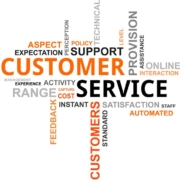The Importance of Empathy
Having empathy allows us to connect with others on a deep level, foster understanding, compassion, and positive relationships. A key component of being empathetic is the ability to practice active listening. This means that you are genuinely listening when others share their thoughts and feelings. We live in a fast-paced world. Many people are often trying to multi-task, not realizing that they cannot give 100% attention to listening while trying to do other things. Being more attentive and focusing on active listening has been a goal of mine this year. During presentations, 1:1 meetings, team meetings… aside from taking notes, I am truly trying to give my time and attention to the person on the other end of the [Zoom] call. On a personal level, I try to leave my cell phone on the counter when playing with my kids or drinking wine with a friend. Nothing feels worse than talking to someone who is clearly busy doing other things. I could go on and on about the negative effects of multi-tasking (and how it demotivates those around you), but I’ll save that for another blog.
I attribute the ability to have empathy to my time working in the hospitality industry. Though hotel operations are busy and chaotic, when interacting with guests, you must give them your undivided attention. Without doing so, you might miss a single important detail that can take their experience from good to great. It’s important to be present, listen, and show genuine concern. When you’re empathetic, you adjust your communication style to connect better with different people. Empathy helps convey messages effectively – it’s not what you say, it’s how you say it. Empathy also helps build trust and rapport. When you take the time to actively listen, encourage, and acknowledge others, you can better understand backgrounds, challenges, aspirations, and help create stronger bonds. Here are a few ways I check in with myself, to ensure I’m being empathetic –
- Active listening. Again, this is one I could talk about for days. It’s a huge pet peeve of mine when the person/people I’m taking to are clearly distracted by something else. Tips… put away anything that could be distracting. Maintain eye contact. Show genuine interest.
- Pay attention to non-verbal cues. Look at body language, facial expressions, tone. It’s sometimes what isn’t said that will be more important than what is communicated.
- Acknowledge emotions. Validate other people’s feelings. Don’t try to relate, assume or make it about you. That will cause the other person to shut down and often just agree with you. Instead, a simple “I understand how you feel” can go a long way.
- Be supportive. Recognize signs of burnout or stress in others. Offer support that is meaningful. For example, if someone seems overwhelmed, try to help them identify the pain point and address that single issue.
I’ll end with a personal story of how being empathetic has helped foster relationships, inside and outside of work. I was getting ready to go on maternity leave to give birth to my second baby. I was working with a client on handing off some of the work I had been doing, and she just spent time asking questions about what I had anticipated maternity leave would be like with a newborn and toddler. She had gone through that before, being a mom of 3, and was able to give me some tips of how to make the most of it. A day after I got home from the hospital with my newborn baby, I had a package at my door with pre-packaged frozen meals for my family, for an entire week! Not only that, but it included 3 personalized mugs (one for me, my husband, and my toddler) and a container of delicious hot chocolate mix, to keep my toddler engaged at a time where most of my attention was given to the baby. She continued to check in on me throughout my leave, not about work at all, but wanting to see how I was adjusting to my new life. This has evolved from a client relationship to a genuine friendship that I value dearly. Being empathetic makes it easy to understand others, giving the opportunity to deliver personalized experiences and forming deep connections.
“Empathy has no script. There is no right way or wrong way to do it. It’s simply listening, holding space, withholding judgment, emotionally connecting, and communicating that incredibly healing message of ‘You’re not alone.’” – Brenè Brown
How do you show empathy to others? I’d love to hear from you. Send me a note at jennaw@idebamarketing.com or feel free to comment on LinkedIn.
Jenna Whelan – VP, Consulting and Research Services









